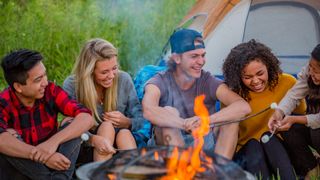Teenagers can react to an invitation to the suggestion ‘let’s go camping’ with enthusiasm or reluctance, and their attitude will likely flip-flop as the camping dates get closer.
But, with a little advanced planning, some foresight into teenage thought processes, and a pinch of parental patience, camping with teenagers and introducing them to wild places can instill a life-long love of camping and spending time in the woods.
Here are 10 essential tips from someone who has been there and earned the t-shirt. And we’ve also got advice for anyone whose children are a bit younger, in our guide to camping with kids.
- Make sure your teens (and you) get a good rest with the best sleeping bags
- Take the stress out of camping with the best pop up tents
- If you’ve ever asked ‘Why go camping?‘, we’ve got loads of good reasons
1. Start close to home
Introduce teenagers to camping with small steps. Avoid overwhelming teens with an ‘epic’ 10-day wilderness expedition for that first trip. Start with a 3-day weekend at a park close to home. In addition to the necessary camping equipment, let the teenagers bring a favourite pillow, more than enough clothes, and other gear they think is ‘essential’. Shorter trips help reduce the stress of new experiences and let them learn new skills and gain confidence in their abilities at a realistic rate.
2. Share the planning
Give teens a role in determining where to camp, when to go, and what’s considered ‘must-have’ gear. Start with options and help them narrow the choices to fit their interests and curiosity. By taking ownership of these decisions, the teens arrive at the campsite ready to shift from reading a website description to exploring the landscape in person. Getting them involved can turn apprehension into smiles, laughter, and high fives. It also means they can’t blame you for everything if things go awry.

3. Give them a job
When camping with teenagers, ask one with organisational skills to set-up the tent and arrange the sleeping pads, sleeping bags, backpacks, water bottles, and headlamps. There’s a sense of pride in finding a place for everything. For teenagers who prefer less structured instructions, send them out to create a map of the camp. Where are the bathrooms? Where can we fill water bottles? Where can we find wood for a campfire? Just as important as setting up camp, these tasks keep teens from getting bored waiting for mom and dad to do the work.
As an alternative, consider giving them an assignment that pushes them out of their comfort zone. It’s a great way to learn and build confidence with a new activity like camping.
4. Screen time

Taking a teenager’s electronic device away is like depriving them of oxygen. Instead of locking smartphones and tablets in the glovebox, use the electronics to your advantage. Ask the teens to look for apps that can improve their camping experience – for example, apps that help you navigate, identify plants, decipher animal tracks or follow stars across the night sky.
There’s one more element that’s in your favour. In many parks, Wi-fi access and signal strength are limited. Frustrated because they can’t play games or watch a movie, teens will look for something else to do.
5. Pack plenty of supplies
A hungry teenager is an extra-moody teenager. Bring lots of food, and include some treats in the camp larder – make it feel like a holiday.
6. Bring a friend
Adolescence is a time of change that can be both fun and challenging for parents and kids. Teenagers push for independence and parents pull back, worried about their progeny trying to go too far, too fast. The best way to solve that conundrum is to invite a friend along with you. Better yet, set-up a separate tent for them to sleep in. Kids will stay up late debating whether or not they like camping and parents can get a good night’s sleep.
7. Leave no trace
Parks have hiking trails to follow. Encourage them to feel comfortable breaking off the established trails and climbing to the top of the next hill to see what they can see. Keep them safe in dangerous or questionable terrain, but encourage exploration, which will give them a sense of control over their own experiences. Teach them to respect Mother Nature and practice Leave No Trace principles.
8. Build a campfire

There are good and bad sides to campfires but there’s no denying that flickering flames of orange, red, white, and blue mesmerise kids and teenagers. Time spent gathering dead wood, learning how to arrange the wood, and striking a match is a fundamental right of passage for every camper. Feeding the fire leads to roasting marshmallows, making s’mores, telling ghost stories, and building memories. If there’s anything about the first camping trips that inspire a ‘can we do that again?’ request it’s building a roaring campfire.
9. Have a plan B
Pay attention to the weather. Unseasonably cold temperatures, hard rains or fierce winds that keep everyone stuck inside a small tent can dampen enthusiasm for future trips. Gauging the group’s desire to stay or go is a skill worth learning early.
10. Make the most of it
Time goes past scarily fast. Relish time spent outdoors with your kids while you can, and don’t ruin it unnecessarily by getting upset or mad when they act all teenagery. Give them space, let the mood pass, then move on. Before you know it, if you play your cards right, they’ll be taking you camping and showing you their newfound favorite wilderness places.

